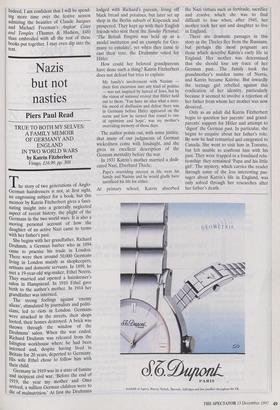Nazis but not nasties
Piers Paul Read
TRUE TO BOTH MY SELVES: A FAMILY MEMOIR OF GERMANY AND ENGLAND IN TWO WORLD WARS by Katrin Fitzherbert Virago, £16.99, pp. 308 The story of two generations of Anglo- German hairdressers is not, at first sight, an engrossing subject for a book; but this memoir by Katrin Fitzherbert gives a fasci- nating insight into a generally neglected aspect of recent history, the plight of the Germans in the two world wars. It is also a moving personal account of how the daughter of an active Nazi came to terms With her father's past. She begins with her grandfather, Richard Druhmm, a German barber who in 1894 came to practise his trade in London. There were then around 50,000 Germans living in London mainly as shopkeepers, artisans and domestic servants. In 1899, he met a 19-year-old wig-maker, Ethel Norris. They married and opened a hairdresser's salon in Hampstead. In 1910 Ethel gave birth to the author's mother. In 1914 her grandfather was interned.
The strong feelings against 'enemy aliens', stimulated by journalists and politi- cians, led to riots in London. Germans were attacked in the streets, their shops looted, their homes destroyed. A brick was thrown through the window of the Druhmms' salon. When the war ended, Richard Druhmm was released from the Islington workhouse where he had been interned and, despite having lived in Britain for 20 years, deported to Germany. His wife Ethel chose to follow him with their child.
Germany in 1919 was in a state of famine and incipient civil war. 'Before the end of 1919, the year my mother and Oma arrived, a million German children were to die of malnutrition.' At first the Druhmms lodged with Richard's parents, living off black bread and potatoes, but later set up shop in the Berlin suburb of Kopenick and prospered. They kept up with their English friends who sent them the Sunday Pictorial. 'The British Empire was held up as a model institution and an example for Ger- many to emulate', yet when they came to cast their vote, the Druhmms voted for Hitler.
How could her beloved grandparents have done such a thing? Katrin Fitzherbert does not defend but tries to explain:
My family's involvement with Nazism — their first excursion into any kind of politics — was not inspired by hatred of Jews, but by the vision of national revival that Hitler held out to them. 'You have no idea what a terri- ble mood of disillusion and defeat there was in Germany before Hitler appeared on the scene and how he turned that round to one of optimism and hope', was my mother's overriding memory of those days.
The author points out, with some justice, that many of our judgments of German wickedness come with hindsight, and she gives an excellent description of the German mentality before the war.
In 1931 Katrin's mother married a dedi- cated Nazi, Eberhard Thiele:
Papa's overriding interest in life were his family and Nazism and he would gladly have sacrificed his life for either.
At primary school, Katrin absorbed the Nazi virtues such as fortitude, sacrifice and resolve which she was to find difficult to lose when, after 1945, her mother took her son and daughter to live in England.
There are dramatic passages in this story as the Thieles flee from the Russians, but perhaps the most poignant are those which describe Katrin's early life in England. Her mother was determined that she should lose any trace of her German past. The family took the grandmother's maiden name of Norris, and Katrin became Katrine. But inwardly the teenage girl rebelled against this eradication of her identity, particularly because it seemed to involve a rejection of her father from whom her mother was now divorced.
Only as an adult did Katrin Fitzherbert begin to question her parents' and grand- parents' support for Hitler and attempt to 'digest' the German past. In particular, she began to enquire about her father's role. By now he had remarried and emigrated to Canada. She went to visit him in Toronto, but felt unable to confront him with his past. They were trapped in a fossilised rela- tionship: they remained 'Papa and his little girl'. The mystery, which carries the reader through some of the less interesting pas- sages about Katrin's life in England, was only solved through her researches after her father's death.


















































































 Previous page
Previous page